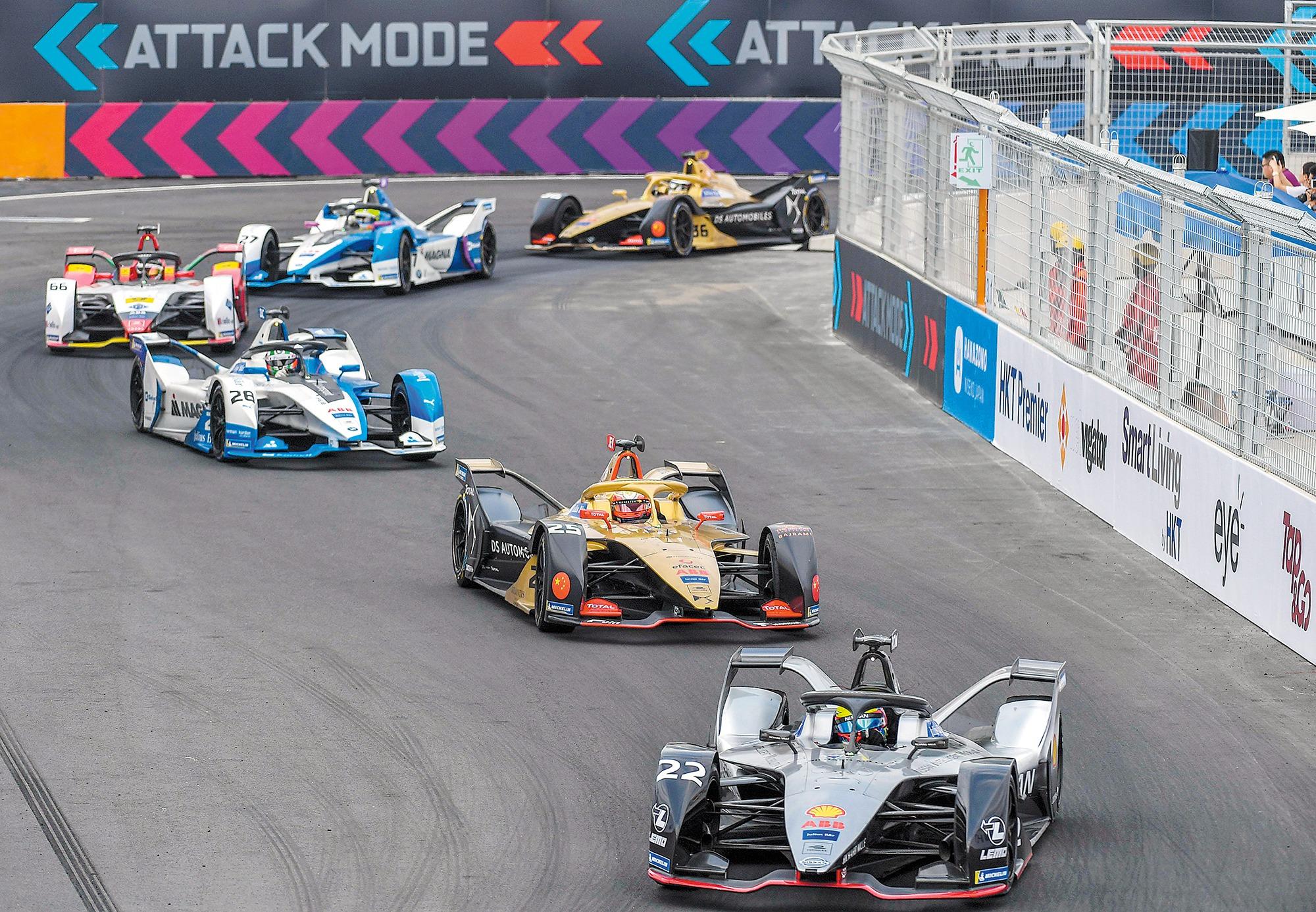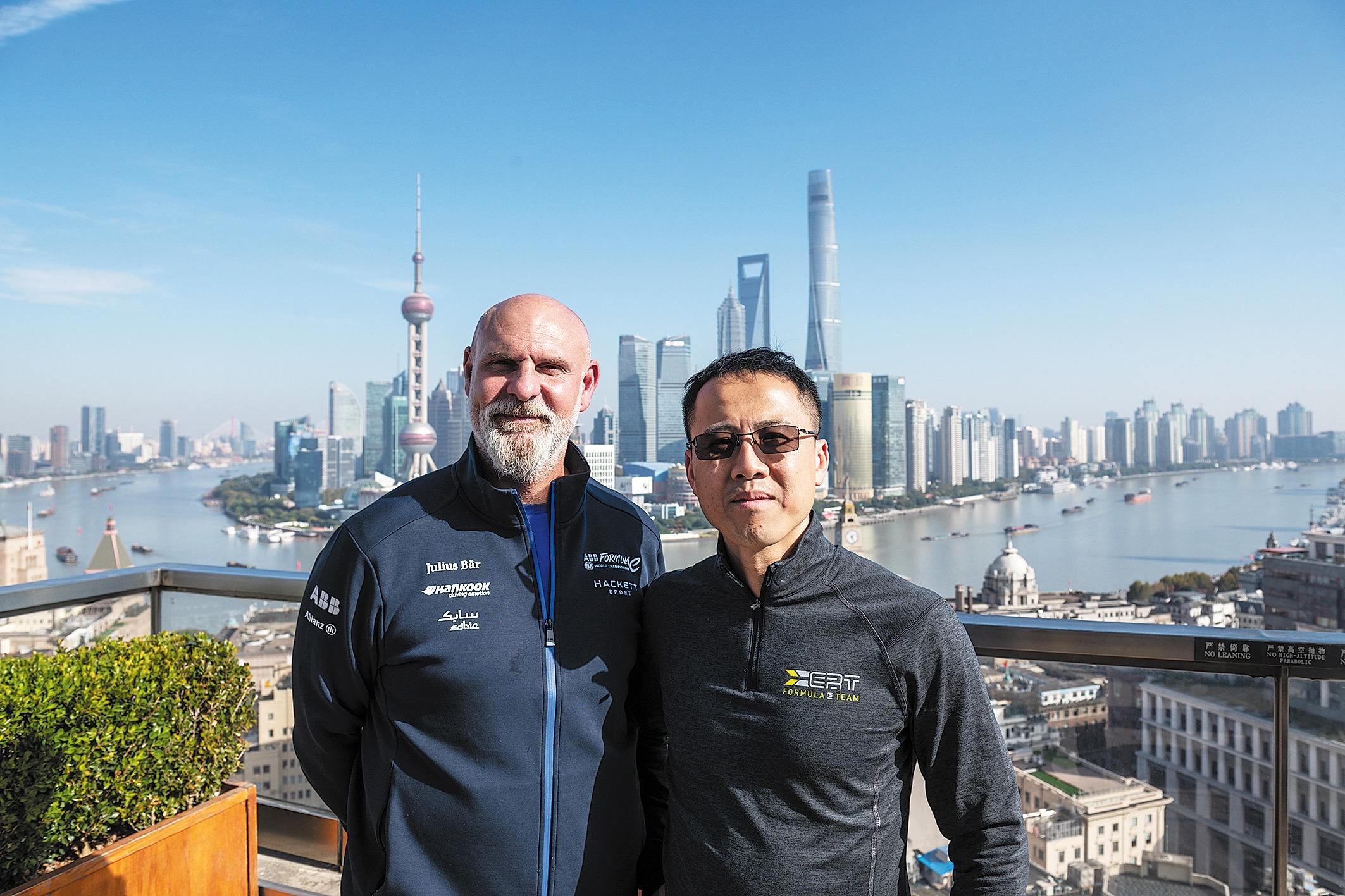Debut Shanghai race set to succeed amid family-friendly format, lower prices, surge in EV interest
 Racers vie for position during the 2019 Sanya E-Prix on Hainan Island, on March 23, 2019 — the last time the Formula E Championship was staged in China. The series returns to China next year when it makes its Shanghai debut over the weekend of May 24-25. (PHOTO / CHINA NEWS SERVICE)
Racers vie for position during the 2019 Sanya E-Prix on Hainan Island, on March 23, 2019 — the last time the Formula E Championship was staged in China. The series returns to China next year when it makes its Shanghai debut over the weekend of May 24-25. (PHOTO / CHINA NEWS SERVICE)
Formula E CEO Jeff Dodds said he expects next year’s ABB FIA Formula E World Championship race in Shanghai to be a sellout.
The last time a Formula E race was held in China was in 2019, in Sanya, Hainan province, with the championship set to debut in Shanghai next May.
Dodds, who was speaking at a media briefing at the Peace Hotel in Shanghai on Nov 22, said the reasons behind his optimism include a growing interest in the all-electric championship and electric vehicles (EVs), a convenient public transport system that provides easy access to the Shanghai International Circuit, and affordable ticket prices.
He revealed that tickets for the Shanghai race — which is scheduled to take place on May 25 and 26 — will be “significantly cheaper” than Formula 1 tickets, and be on sale by the end of the year.
Also at the media briefing was Alex Hui, the team principal of the Chinese Formula E outfit ERT. Hui said that the unique qualities of an all-electric race would go a long way to drawing crowds, especially families.
“Unlike Formula 1, our race is much quieter and there aren’t exhaust fumes. This makes the race very family-friendly,” he said.
“Moreover, unlike the Formula 1 race which can go on for hours, a Formula E race is much shorter, and this makes for easier viewing, especially for those who aren’t already fans of motorsports.”
Dodds said he believes China’s status as one of the biggest EV manufacturers in the world gives the Shanghai race special significance.
“The Chinese market is arguably more important than any other market in the world,” said the Briton.
“One of our most important goals is to accelerate the adoption of electric vehicles. Seeing how China is leading the charge in electric vehicle manufacturing, I must say that racing in China is incredibly important to all of our manufacturer partners, and also to our fans.”
Next year marks the 10th anniversary of the founding of the championship. The inaugural race was held in Beijing in September 2014.
“If you saw that race, the cars weren’t very fast and had a maximum speed of 225 km/h,” Dodds said. “For our 10th anniversary, it’s incredibly important that we come back and race again in China and showcase just how far the electric race car has evolved in 10 years. Today, the cars can go 100 km/h faster than they did in Beijing.”
 Formula E CEO Jeff Dodds (left) and Alex Hui, the principal of the ERT Formula E Team, believe China’s importance as a leading market and manufacturer of electric vehicles will contribute to next year’s Shanghai E-Prix being a sellout event. (PHOTO PROVIDED TO CHINA DAILY)
Formula E CEO Jeff Dodds (left) and Alex Hui, the principal of the ERT Formula E Team, believe China’s importance as a leading market and manufacturer of electric vehicles will contribute to next year’s Shanghai E-Prix being a sellout event. (PHOTO PROVIDED TO CHINA DAILY)
Dodds, who was appointed CEO six months ago, said he intends to “turn up the noise level” of the sport by focusing on marketing, public relations, and media outreach efforts.
He noted that Formula E recently inked deals with streaming service Roku TV and American network CBS to expand the championship’s audience reach.
A deal with a media partner in China will be announced in the coming weeks, he added.
Choosing the right race locations is another priority for Formula E as it seeks to expand its global appeal. Dodds indicated that China and the US will be pivotal in this regard.
“We want to race in the most important places in the world,” he said.
“I would love us to be racing more than once a year in China. North America is also incredibly important, given the size of that market and the passion in that market for motorsports.”
Both Dodds and Hui suggested Formula E should be considered the future of motorsports, noting that the growing awareness of sustainability issues and the fact that electric vehicles are becoming increasingly commonplace on the roads would all play a part in propelling the sport forward.
Dodds pointed out that about 10.5 million electric vehicles were sold in 2022, a huge increase from the 300,000 sold in 2014, and that those numbers are expected to continue to grow annually.
“What this could mean is that our power unit will become more and more relevant while the combustion engine will become less and less relevant to people. I’m very confident that our sport will continue to grow and get bigger and better and more exciting,” he said.
“My kids think that electric cars are completely cool. They think electric vehicles are the most normal things in the world. When they’re ready to drive, they won’t be driving a combustion-engine car — they’ll be driving an electric vehicle.”
Hui echoed those sentiments, noting that electric cars can be just as powerful as petrol-powered ones.
“In the past, petrolheads used to think that electric cars were a joke. Today, they are learning that electric cars can perform amazingly well. Many Chinese EV makers have been producing powerful 1,000-horsepower cars and this too has been helping to change perceptions and getting more people interested in all-electric races,” Hui added.
Looking ahead, Dodds said that Formula E will continue to augment the capabilities of electric race cars so that they can achieve even greater speeds, revealing that fans can look forward to new modifications for the 2024-25 season.
Although next year’s race in Shanghai will take place on a track circuit, Dodds did not rule out the possibility of holding a street race, ideally around the city’s iconic Bund area.
“Street racing is in Formula E’s DNA. But we also want to hold races on tracks because this allows us to show just how fast the cars can go,” he said.
“We recently saw an incredible Formula 1 street race in Las Vegas. What this shows is that nothing is impossible.
“Having a race along the Bund would be amazing. I would love to do it. If the local government is interested in talking to us about putting on a race like that, we’re all ears.”


